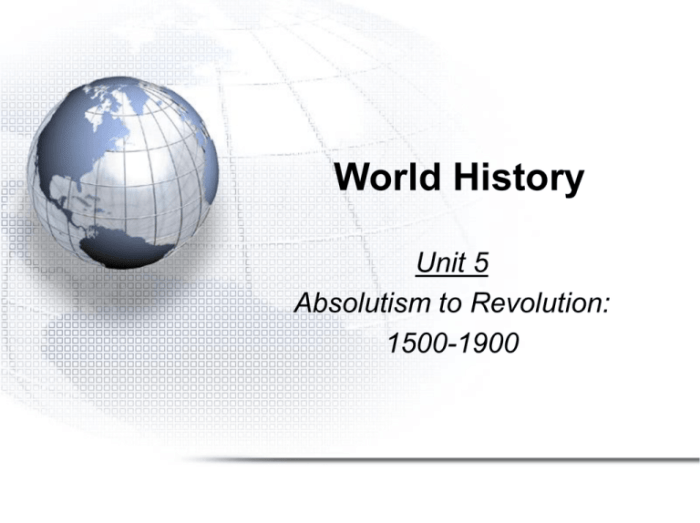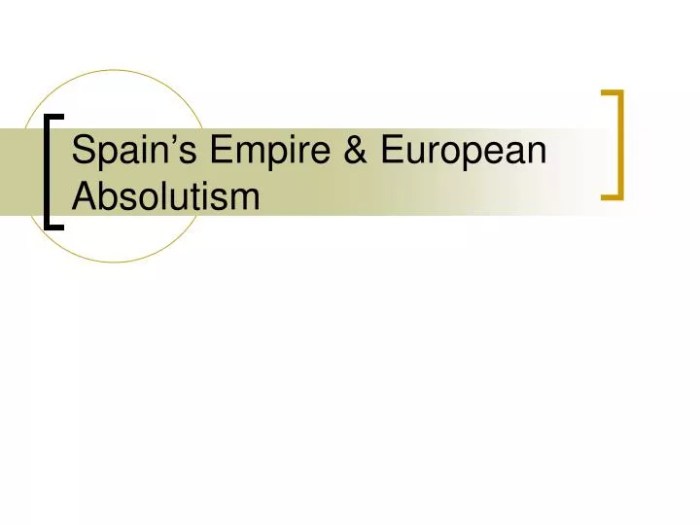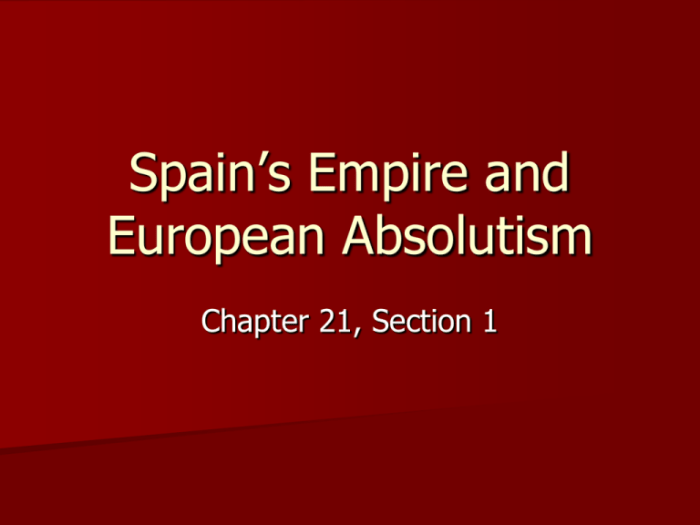Spain’s empire and European absolutism are intertwined concepts that shaped the political, economic, and cultural landscape of Europe for centuries. This essay will explore the rise and expansion of Spain’s empire, its role in the development and spread of absolutism, and the cultural and intellectual contributions of Spain to Europe.
Spain’s empire emerged as a global superpower in the 16th century, controlling vast territories in Europe, the Americas, and Asia. The empire’s wealth and power were instrumental in the rise of absolutism, a political system characterized by the concentration of power in the hands of a single ruler.
Historical Context

The rise of Spain’s empire in Europe was a gradual process that began with the marriage of Isabella of Castile and Ferdinand of Aragon in 1469. This union brought together the two most powerful kingdoms in the Iberian Peninsula and laid the foundation for the Spanish Empire.
Several factors contributed to Spain’s dominance during this period, including its geographic location, its military prowess, and its economic strength. Spain’s location on the Atlantic coast gave it easy access to trade routes to the Americas, Africa, and Asia. Its military strength allowed it to conquer vast territories in the New World and in Europe.
And its economic strength, based on its control of the silver mines of the Americas, gave it the resources to support its military and political ambitions.
Political and Economic Structures, Spain’s empire and european absolutism
Spain’s empire was governed by a centralized monarchy. The king of Spain was the supreme ruler and had absolute power over his subjects. The empire was divided into several provinces, each of which was governed by a viceroy appointed by the king.
The economic structure of Spain’s empire was based on mercantilism. The Spanish government sought to control all aspects of the economy in order to maximize its wealth and power. This included regulating trade, setting prices, and controlling the production of goods.
European Absolutism

European absolutism was a political system that emerged in Europe in the 16th and 17th centuries. Absolutism was characterized by the concentration of all power in the hands of the monarch. The monarch was the supreme ruler and had absolute authority over his subjects.
Spain’s Role in the Development of Absolutism
Spain played a key role in the development and spread of absolutism in Europe. The Spanish monarchy was one of the first to adopt absolutist principles, and the Spanish Empire provided a model for other European monarchs to follow.
Impact of Absolutism on Europe
Absolutism had a profound impact on the political and social landscape of Europe. It led to the decline of feudalism and the rise of centralized states. It also led to the suppression of religious dissent and the persecution of minorities.
Spain’s Influence on European Culture: Spain’s Empire And European Absolutism

Spain’s empire had a profound impact on European culture. Spanish art, literature, and music were highly influential in Europe, and Spanish culture helped to shape the development of European civilization.
Cultural Contributions
- Art: Spanish artists such as Diego Velázquez, Francisco Goya, and Salvador Dalí are among the most famous and influential artists in Western history.
- Literature: Spanish literature is one of the richest and most diverse in the world. Spanish authors such as Miguel de Cervantes, Lope de Vega, and Federico García Lorca are considered to be among the greatest writers of all time.
- Music: Spanish music is known for its passion and energy. Spanish composers such as Isaac Albéniz, Manuel de Falla, and Joaquín Rodrigo are among the most famous and influential composers in the world.
The Decline of Spain’s Empire
The decline of Spain’s empire began in the 17th century. Several factors contributed to the empire’s decline, including internal political and economic problems, as well as external pressures from other European powers.
Internal Factors
- Political instability: Spain was plagued by political instability in the 17th century. The empire was ruled by a series of weak and incompetent kings, and the government was often corrupt and inefficient.
- Economic problems: Spain’s economy was heavily dependent on the silver mines of the Americas. When the silver mines began to decline in the 17th century, Spain’s economy suffered.
External Pressures
- War with France: Spain was engaged in a series of wars with France in the 17th and 18th centuries. These wars drained Spain’s resources and weakened its military power.
- Rise of other European powers: Other European powers, such as England and France, began to challenge Spain’s dominance in Europe and in the Americas.
The decline of Spain’s empire had a profound impact on Europe. It led to the rise of new European powers, such as England and France, and it helped to shape the political and economic landscape of Europe in the centuries that followed.
Essential Questionnaire
What were the key factors that contributed to Spain’s dominance during the 16th century?
Spain’s dominance during the 16th century was due to a combination of factors, including its vast empire, its control of the transatlantic trade routes, and its military strength.
How did Spain’s empire contribute to the development of absolutism?
Spain’s empire provided the financial and military resources that allowed the Habsburg dynasty to establish and maintain absolutist rule in Spain and its European territories.
What were the cultural and intellectual contributions of Spain’s empire to Europe?
Spain’s empire played a major role in the spread of Renaissance and Baroque culture throughout Europe. Spanish art, literature, and music had a profound influence on European culture, and Spanish scholars made significant contributions to science and philosophy.